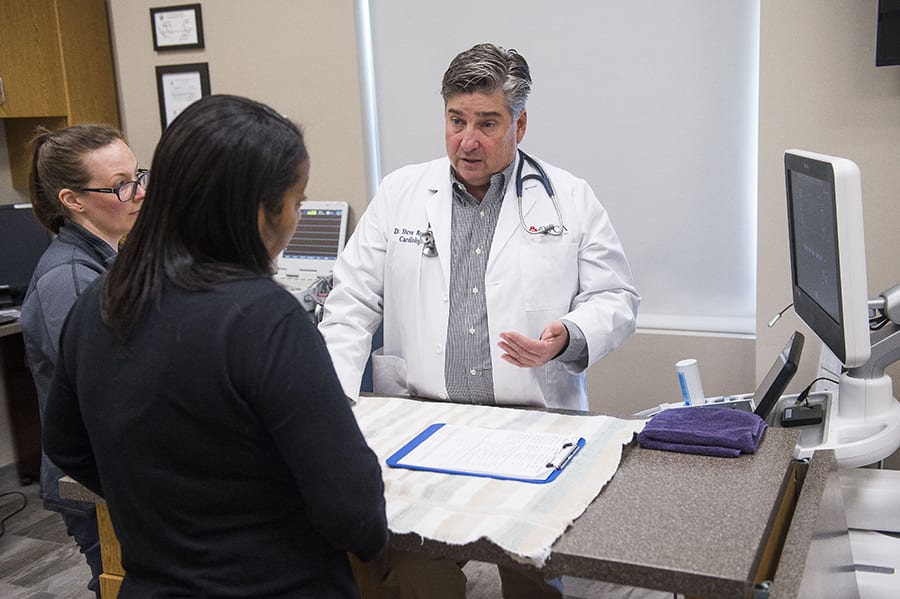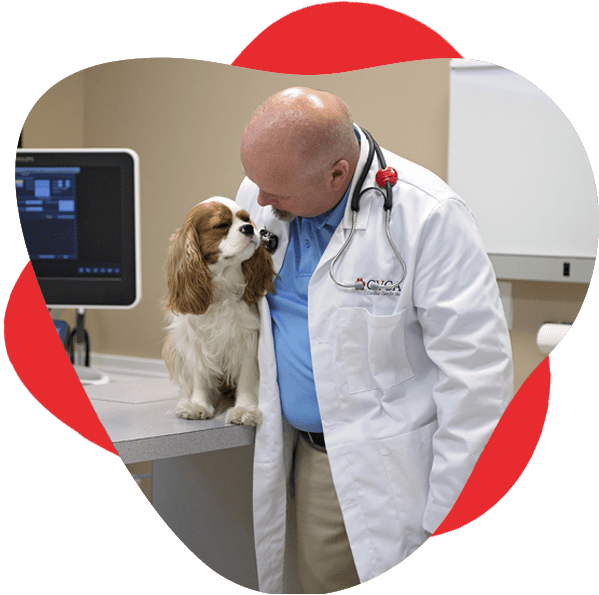Checking Out the Vital Solutions Used by a Veterinary Cardiologist: Comprehending Ultrasound and CT Check Methods
Veterinary cardiologists play a crucial function in the health of pets by diagnosing and dealing with numerous heart disease. They use sophisticated imaging techniques, such as cardiac ultrasound and CT scans, to provide exact examinations. Each technique has its unique benefits and applications. Recognizing these methods is necessary for animal owners looking for the very best look after their companions. What factors should pet dog proprietors consider when picking in between these diagnostic devices?

The Role of Vet Cardiologists in Pet Dog Healthcare
Veterinary cardiologists play a vital role in the health care of family pets, concentrating specifically on diagnosing and treating heart-related conditions. They have specialized training that permits them to interpret complex diagnostic tests and determine different cardio concerns. These specialists utilize advanced techniques, such as echocardiography and electrocardiography, to evaluate heart function and structure accurately.Veterinary cardiologists likewise establish tailored treatment plans that may include medicines, way of life adjustments, and, in many cases, medical treatments. Their expertise encompasses educating pet proprietors about heart health, stressing the relevance of normal exams and very early detection of potential problems. Cooperation with basic vets is important, as it guarantees comprehensive look after pets with suspected heart problems. By providing specialized services, vet cardiologists considerably improve the high quality of life for pets and provide satisfaction for their owners, reinforcing the relevance of heart wellness in general pet health.
Typical Cardiac Concerns in Animals
Common heart problems in pets can substantially affect their health and top quality of life. Heart murmurs, numerous sorts of cardiomyopathy, and congenital heart issues are among one of the most common conditions that vets experience. Board Certified Veterinary Cardiologist. Recognizing these problems is essential for pet dog owners to assure timely medical diagnosis and suitable therapy
Heart Murmurs in Pets
Heart murmurs can be a resource of concern for family pet proprietors, they are not always a sign of serious health and wellness concerns. A heart murmur is an irregular audio produced by unstable blood circulation within the heart. In pets, these murmurs can be brought on by various aspects, consisting of congenital heart problems, shutoff concerns, or even tension throughout exams. Numerous family pets with heart whisperings lead regular lives without significant health and wellness effects. To establish the underlying reason, veterinary cardiologists typically utilize analysis strategies such as echocardiograms and Doppler ultrasounds. Early discovery and assessment are vital, as they might aid take care of any kind of potential cardiac issues efficiently. Family pet proprietors are motivated to consult their vet for a detailed evaluation if a heart murmur is discovered.
Cardiomyopathy Kind Explained
Cardiomyopathy includes a group of illness impacting the heart muscular tissue, bring about endangered heart feature in family pets. One of the most common kinds consist of dilated cardiomyopathy (DCM), hypertrophic cardiomyopathy (HCM), and restrictive cardiomyopathy (RCM) DCM primarily impacts canines, creating the heart to weaken and expand, which reduces its capability to pump blood effectively. In comparison, HCM is a lot more common in felines, identified by the enlarging of the heart walls, frequently causing obstructed blood circulation. RCM, though less typical, takes place when the heart muscle comes to be inflexible, restricting its capability to fill with blood. Each kind offers one-of-a-kind difficulties in medical diagnosis and treatment, necessitating specialized vet cardiological assessment to ensure peak monitoring and take care of impacted pet dogs.
Congenital Heart Issues
Hereditary heart problems represent a substantial group of cardiac concerns in pets, unique from gotten problems such as cardiomyopathy - CT Scans For Animals. These defects are structural irregularities present at birth, affecting the heart's regular function. Common types consist of license ductus arteriosus, ventricular septal flaws, and pulmonic constriction. Symptoms may differ commonly, ranging from light to serious, and can consist of exercise intolerance, coughing, and trouble breathing. Early diagnosis via innovative imaging methods like ultrasound is essential for reliable administration. Vet cardiologists play a crucial duty in identifying these problems and suggesting suitable treatment choices, which might consist of medical management or surgical treatment. Recognizing congenital heart issues permits far better end results and improved top quality of life for influenced pets
Comprehending Heart Ultrasound: Just How It Works
A considerable variety of veterinary techniques currently utilize cardiac ultrasound as a necessary visit analysis device for examining heart health in pets. This non-invasive strategy utilizes high-frequency audio waves to develop pictures of the heart's framework and feature. During the procedure, a veterinary specialist uses a gel to the pet's upper body and makes use of a transducer to emit ultrasound waves. These waves bounce off the heart and bordering structures, generating real-time images on a monitor.Veterinarians can analyze numerous facets of cardiac wellness, including chamber size, wall activity, and shutoff function. Additionally, cardiac ultrasound enables the detection of irregularities such as fluid buildup and genetic heart problems. This method is important for identifying problems that may not show up through common radiographs. By giving thorough info regarding the heart's anatomy and efficiency, cardiac ultrasound help in developing efficient treatment prepare for animals dealing with heart condition.
The Relevance of CT Checks in Detecting Heart Issues
How do CT scans improve the medical diagnosis of heart conditions in veterinary medicine? CT scans offer detailed cross-sectional photos of the heart and surrounding frameworks, enabling vets to envision complicated anatomical relationships. This imaging method is specifically valuable in recognizing hereditary heart flaws, heart growths, and irregularities in blood vessels. By making use of sophisticated imaging formulas, CT scans can evaluate heart chamber sizes and function, using a detailed sight that may be tough to attain with traditional methods.Additionally, CT angiography can imagine blood circulation and identify locations of stenosis or blockage, which is essential for planning possible interventions. The speed and accuracy of CT scans likewise assist in fast medical diagnoses, essential in emergency situation situations. Inevitably, the unification of CT checks right into veterinary cardiology considerably improves the precision of diagnoses, allowing targeted therapy plans and boosting client results for pets experiencing heart problems.
Contrasting Ultrasound and CT Scan Techniques
While both ultrasound and CT scans are invaluable devices in vet cardiology, they supply distinct advantages and limitations that influence their use in detecting heart problems. Ultrasound, or echocardiography, provides real-time imaging of the heart's framework and feature, enabling veterinarians to examine heart chambers, shutoffs, and blood circulation. It is especially effective for evaluating problems like heart disease and cardiomyopathy. Nonetheless, ultrasound might be restricted in visualizing certain anatomical frameworks because of individual dimension or obesity.In comparison, CT checks deal detailed cross-sectional images of the heart and surrounding tissues, making them perfect for determining structural irregularities, growths, or vascular problems. CT scans give detailed understandings, they need sedation and may entail radiation direct exposure. Eventually, the choice in between ultrasound and CT scans depends on the details professional situation, the client's problem, and the info needed for an exact medical diagnosis.
Treatment Alternatives Offered Through Vet Cardiology
Veterinary cardiology supplies an array of treatment alternatives tailored to address numerous heart conditions in pets. Treatment strategies commonly begin with way of living modifications, consisting of diet plan adjustments and exercise changes, aimed at improving general heart health. Medicines play a vital function, with cardiologists prescribing medications such as diuretics, beta-blockers, and ACE inhibitors to enhance important source and handle signs and symptoms cardiac function.In more serious instances, interventional procedures, such as balloon valvuloplasty or stent positioning, may be needed to alleviate obstructions or boost blood flow. For particular congenital heart flaws, medical options might be explored to deal with architectural issues. Furthermore, recurring monitoring and follow-up care are crucial components of a detailed treatment plan, enabling for prompt adjustments based on the animal's action to treatment. Overall, veterinary cardiology concentrates on supplying reliable, individualized like optimize the health and wellness and wellness of pet people with heart problems.
How to Prepare Your Animal for a Cardiac Examination
Preparing a pet dog for a heart analysis is essential to guarantee accurate results and a smooth process. Owners ought to first schedule the appointment with the veterinary cardiologist and discuss any specific requirements or concerns. It is recommended to withhold food for at the very least 12 hours prior to the evaluation, as this aids boost imaging top quality throughout procedures like ultrasound or CT scans.Additionally, preserving a calm environment on the day of the consultation can aid lower the family pet's stress and anxiety. It is helpful to bring along any type of relevant medical documents, consisting of previous tests and medications (CT Scans For Animals). Proprietors ought to also make specific that their animal fits and leashed throughout transport to the clinic. Ultimately, acquainting themselves with the assessment procedure can aid and ease worries in asking educated concerns during the appointment. By complying with these steps, proprietors can contribute considerably to the effectiveness of the heart evaluation
Regularly Asked Questions
For how long Does a Heart Ultrasound or CT Scan Take?
The period of a heart ultrasound usually varies from 30 to 60 minutes, while a CT check may take around 15 to 30 mins. Elements such as the person's condition can influence these time price quotes.

Exist Any Kind Of Threats Related To These Diagnostic Procedures?

Can I Remain With My Pet Dog During the Procedure?
The veterinary facility's policy typically determines whether pet owners can remain during procedures. While some clinics motivate owner presence for convenience, others might need splitting up to ensure security and suitable problems for analysis imaging.
Exactly how Much Do These Analysis Tests Typically Price?
The prices of diagnostic tests, such as ultrasound and CT scans, typically vary based upon place and center. Normally, costs range from a few hundred to over a thousand bucks, showing the complexity and modern technology included.
What Is the Recovery Refine After a Cardiac Assessment?
The recuperation process after a cardiac examination includes monitoring the pet dog for any type of prompt responses, guaranteeing convenience, and limiting exercise. Vets generally give post-evaluation directions to guide family pet owners throughout this important healing duration. Heart whisperings, different types of visite site cardiomyopathy, and genetic heart issues are among the most common conditions that veterinarians run into. A heart murmur is an uncommon sound created by turbulent blood flow within the heart. Cardiomyopathy incorporates a group of illness influencing the heart muscle, leading to jeopardized cardiac function in pet dogs. Congenital heart problems stand for a significant classification of heart concerns in pets, unique from gotten problems such as cardiomyopathy. Ultrasound, or echocardiography, provides real-time imaging of the heart's structure and feature, permitting vets to assess heart chambers, valves, and blood flow.